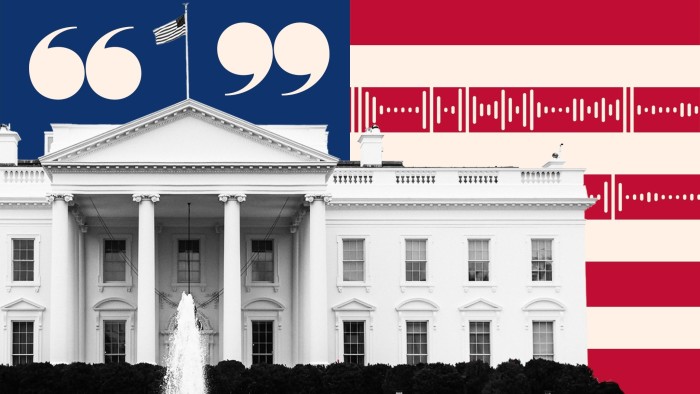Joe Biden faced a growing clamour among Democrats to drop out of the 2024 presidential race on the weekend despite stepped-up public appearances aimed at proving he is mentally fit to take on Donald Trump.
Biden has two campaign events in the swing state of Pennsylvania on Sunday after a high-stakes primetime interview on Friday night failed to reassure fellow Democrats panicked by the 81-year-old’s shaky debate performance last week.
“It’s the worst possible outcome,” one veteran Democratic operative told the Financial Times after Biden’s interview aired on ABC News. “Not nearly strong enough to make us feel better, but not weak enough to convince Jill [Biden] to urge him to pull the plug.”
David Axelrod, the architect of Barack Obama’s successful 2008 presidential campaign, warned after the interview that Biden was “dangerously out-of-touch with the concerns people have about his capacities moving forward and his standing in this race”.
The roll call of Democrats calling for Biden to withdraw was joined on Saturday by Angie Craig, a House member from a swing district in Minnesota.
“President Biden is a good man & I appreciate his lifetime of service,” Craig wrote on social media platform X.
“But I believe he should step aside for the next generation of leadership. The stakes are too high.”
NBC News reported that the Democratic leader in the House, Hakeem Jeffries, was set to discuss the president’s candidacy among colleagues on Sunday.
Throughout the roughly 20-minute interview on ABC, Biden rejected opinion polls that show him trailing Trump both nationwide and in the pivotal swing states that will determine the election outcome.
“I don’t think anybody is more qualified to be president or win this race than me,” Biden said.
The president also dodged questions about whether he would be willing to undergo cognitive and neurological testing, at one point replying: “I have a cognitive test every single day, every day I have that test.”
Biden added: “You know, not only am I campaigning, I am running the world . . . for example, today, before I came out here, I am on the phone with the prime minister of, well anyway, I shouldn’t get into the detail, with Netanyahu, I’m on the phone with the new prime minister of England.” The president appeared to be referencing a call he had on Thursday with Israeli Prime Minister Benjamin Netanyahu, and another on Friday with new UK Prime Minister Sir Keir Starmer.
In another exchange, Biden appeared to suggest that nobody would be able to convince him to suspend his re-election bid, saying: “If the Lord almighty tells me to, I might do that.”
“It seems that the only person who still believes Biden should still be in the race is Biden,” said one top Democratic donor. Another Democratic donor called the interview “pathetic”, while another said it was “too little, too late”.
Many Democratic lawmakers, party operatives and influential donors have privately called for Biden to suspend his re-election campaign after last week’s debate reignited questions about the president’s age and fitness for office. But more critics have been willing to go public with their concerns in recent days.
Maura Healey, the Democratic governor of Massachusetts, became the first state governor to suggest Biden step aside on Friday. Healey was among governors who met the president for emergency talks at the White House this week.
She issued a statement urging him to “listen to the American people and carefully evaluate whether he remains our best hope to defeat Donald Trump”.
Meanwhile, the Washington Post reported on Friday that Mark Warner, a senator from Virginia, was working to assemble a group of Democratic senators to ask Biden to exit the race. A spokesperson for Warner did not respond to a request for comment.
Earlier on Friday, Biden delivered a defiant speech in Wisconsin, a swing state, telling a crowd of supporters that he would not bow to the mounting pressure on him to quit.
“Let me say this as clearly as I can: I’m staying in the race. I’ll beat Donald Trump.”
Reporters travelling with Biden noted several people standing outside the venue where he spoke in Wisconsin holding signs urging him to “bow out” and “pass the torch”. Another sign read: “Give it up, Joe.”
His campaign on Friday said it would spend another $50mn on advertising in the month of July, including for ad spots that would run during this month’s Republican National Convention and the Olympics.
Biden’s vice-president Kamala Harris, California governor Gavin Newsom and Michigan governor Gretchen Whitmer — all seen as possible candidates should Biden step aside — have remained publicly loyal to the president’s campaign. At a July 4 celebration at the White House on Thursday evening, Biden joined hands with his vice-president as some people in the crowd chanted, “four more years”.
But other prominent Democrats are more reluctant to share the stage with the president. When Biden visited Wisconsin on Friday, he was joined by the state’s Democratic governor, Tony Evers — but not Tammy Baldwin, the state’s Democratic senator, who is polling far ahead of the president.
The latest FiveThirtyEight polling average shows Trump leading Biden by just shy of two points in Wisconsin.
Have your say

Joe Biden vs Donald Trump: tell us how the 2024 US election will affect you






















































